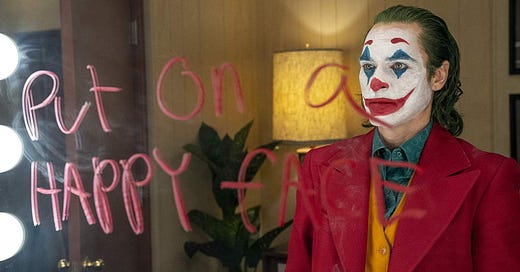“When the chips are down, these… ‘civilized people’, they’ll eat each other.”
-Joker, The Dark Knight (2008)
“What do you get when you take a mentally ill loner and put him with society that abandons him and treats him like trash? You get what you fucking deserve”
-Arthur Fleck, Joker (2019)
I didn’t enjoy Joker (2019). I thought it was a brilliant film, and Joaquin Phoenix’s acting has been praised by many stellar actors as among the best work they’ve ever seen, and I thought the writing was tight and plausible. It was a great, important film… but I didn’t enjoy it. I’ve suffered in life, from traits that I didn’t choose and (more) from choices I made but came to regret. Perhaps no one has as many instances of regrettable choices as an addict and while I am in recovery I am an addict. I’ve seen a great deal of violence in my life, I’ve spent years in very real poverty… and I’ve even lived in New York City (in Harlem and Wash. Heights, right across the East River from many of the filming locations of the film). Watching the film gave me a sense of sadness and an empathetic reaction in a number of directions. I’ve been in fights. I’ve been mugged and attacked by strangers. I’ve been questioned by the police. I’ve sat across from many social workers like his bored and under-resourced caseworker. I’ve hustled for bad jobs. I’ve argued with employers, over a pittance. I’ve lived in dangerous neighborhoods. I’ve even shot at people in self-defense. I didn’t really see myself in Arthur Fleck, but I understood the misery and desperation of his gritty, fictional, urban society because I’ve seen it in my own-a thousandfold.
I will not turn this into a screed against wokeness or a castigation of the legacy media. There’s plenty of that elsewhere in my writing. I just want to focus on the many, many professional critics and journalists who did not have that empathetic reaction… or if they did they allowed it to be swamped by other emotions: disdain, unease, anger.
Joker holds a mirror up to elements of our society that are undeniable and widespread. It illuminates and examines a number of social problems, many of which are getting worse. Arthur is a white male. He’s an incel. He’s mentally ill and working class. He even becomes a violent and attention-seeking criminal during the course of the film. I suspect that his pain and his disappointments and his resentments should be relatable to just about everyone though. None of these identity categories define his identity or his reactions, after all. Anyone who seeks to dismiss him based on these aspects are veering uncomfortably close to the behavior of the many people in the film who dismiss and ignore Arthur without knowing him.
I suspect that the relatability or pathos of this film could only fail to apply to two different but overlapping groups: those who object to perceived political implications or affiliations of the film or its fans… and those who have had an easy and soft enough life that they simply cannot recognize any aspect of their reality in Arthur’s story (and have a dearth of pity large enough to express contempt for of those who can).
I have some disdain for both groups. Anyone who is politically engaged and thinks that we will improve or reform society without understanding and dealing with people like Arthur Fleck are deluded or naïve. Anyone who has had such an easy go of it (nice high school, college, parties, internships, creative job, city apartment, etc.) and still lacks an awareness of their privilege such that they would denigrate this character or this story is (to me) basically a child and I struggle to take such people seriously. To view the real and deep pain of another person (even a fictional character) and ignore or deflect it, or try to fit that character’s personality and reactions into a pre-made box and use the thing as a disposable culture war weapon doesn’t seem like enlightened or compassionate behavior to me. To dismiss Arthur’s suffering is partly to dismiss the suffering of those millions like him (in various ways) after all, and suffering should never be dismissed out of hand.
Joker holds a mirror up to our society. If the image you see reflected makes you sad, or thoughtful, or pitying… good. It might not leave you with a pleasant feeling upon finishing the film but it will probably leave you pensive. Personally I would rather be thoughtful than happy. If the image you see makes you feel angry or defensive perhaps it’s worth your time to really interrogate the implications of this film. Ugliness seen in a mirror is never more than a reflection of yourself, after all.
Interesting Comments:
solidskullz5736
I hate when people say it’s “too dark” it’s a movie about a man descending into insanity and becoming a homicidal maniac crime lord what the fuck were expecting, just because it’s dc doesn’t mean it’s a super hero movie. The movie was a goddamn masterpiece and I will always stand by it
aadhargupta7609
Joker doesnt promote violence, it tells us why violence happens.
TuxedoMedia
Watching Joker caused me to be a kinder and more friendly person in general public. You never know what small kindness will mean to someone.
estebansingh9411
The joker being hated by media and groups but being loved by the ordinary people just shows why it works
slinkraidsagain
The part where Arthur is talking to his therapist and says "you just don't listen do you?" is the most relatable part of this movie for me





